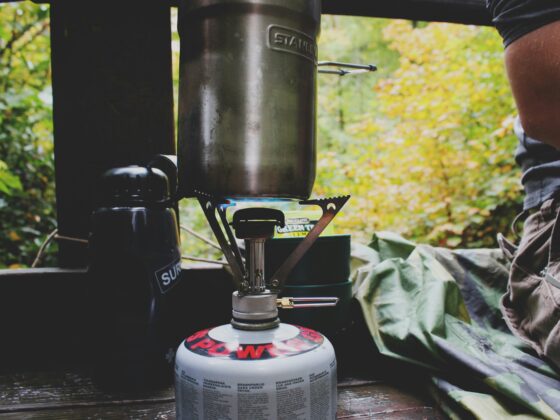With a focus on reducing waste and minimizing the environmental impact, sustainable camping allows you to enjoy the great outdoors while keeping Mother Earth in mind. This article will share various tips and tricks to make your camping experience memorable and environmentally conscious. From choosing the right gear to practicing Leave No Trace principles, we’ve got you covered. Discover how to minimize your carbon footprint, reduce water usage, and utilize renewable energy sources while camping. Learn about eco-friendly camping practices such as composting, recycling, and conserving energy. Whether you are a seasoned camper or just starting out, these tips will ensure you can enjoy the beauty of nature while being a responsible traveler. So grab your gear, head to the nearest campsite, and embark on an eco-friendly camping adventure like no other!
Why choose eco-friendly camping?
When it comes to camping, choosing an eco-friendly approach benefits the environment and enhances your overall experience. By opting for sustainable practices, you can minimize your impact on nature and ensure that future generations can enjoy the beauty of the great outdoors. Eco-friendly camping allows you to connect with nature on a deeper level, immersing yourself in its wonders while actively protecting it. It is a way to align your passion for outdoor adventure with your commitment to environmental stewardship. Moreover, eco-friendly camping often goes hand in hand with a healthier lifestyle, as it encourages you to disconnect from technology, breathe in the fresh air, and engage in physical activities. So, if you’re ready to take your camping experience to the next level, embracing eco-friendly practices is the way to go!
Benefits of eco-friendly camping
There are numerous benefits to choosing eco-friendly camping. First and foremost, it allows you to reduce your carbon footprint. By adopting sustainable practices such as using renewable energy sources, minimizing waste, and conserving water, you can significantly decrease the environmental impact of your camping trip. Additionally, eco-friendly camping promotes a greater appreciation for nature and fosters a sense of ecological responsibility. It encourages you to learn more about the ecosystems you visit, the wildlife that inhabits them, and how you can contribute to their conservation.
Furthermore, sustainable camping often leads to a more immersive and authentic experience. By ditching modern conveniences and embracing a simpler way of life, you can truly reconnect with nature and enjoy its tranquility and beauty. Finally, eco-friendly camping can inspire others to follow suit. By setting an example and sharing your experiences, you can encourage friends, family, and fellow campers to adopt sustainable practices, creating a ripple effect that can make a real difference in protecting our planet.
Leave No Trace principles for sustainable camping
One of the fundamental principles of eco-friendly camping is abiding by the Leave No Trace principles. These guidelines are designed to minimize the impact of human activity on natural spaces and preserve the integrity of the environment. The Leave No Trace principles consist of seven fundamental principles:
- Plan ahead and prepare: Before embarking on your camping trip, research the area you will be visiting, familiarize yourself with local regulations, and plan accordingly. This includes packing the necessary gear, food, and supplies, as well as understanding the potential impacts of your visit.
- Travel and camp on durable surfaces: Stick to established trails and campsites to avoid damaging fragile ecosystems. Avoid trampling vegetation and disturbing wildlife habitats by staying on designated paths and using existing campsites whenever possible.
- Dispose of waste properly: Pack out all trash and waste, including food scraps, to ensure the area remains clean and pollutants-free. Practice proper waste management by separating recyclables and disposing them in designated recycling facilities.
- Leave what you find: Do not disturb or remove natural features, plants, or artifacts from their original location. Leave rocks, flowers, and other natural objects as you find them to preserve the area’s natural beauty for others to enjoy.
- Minimize campfire impacts: If campfires are allowed in the area, use established fire rings or pits and only burn small, dead branches. Do not cut down live trees or damage vegetation for firewood. Always follow local fire regulations and guidelines.
- Respect wildlife: Observe wildlife from a distance and do not approach or feed them. Keep food stored securely to prevent attracting animals to your campsite. Respect their natural behavior and habitat by minimizing your impact on their surroundings.
- Be considerate of other visitors: Respect the rights and privacy of other campers and outdoor enthusiasts. Keep noise levels to a minimum, especially during quiet hours, and be mindful of the impact your actions may have on the experience of others.
By following these principles, you can ensure that your camping experience is sustainable, respectful, and enjoyable for both you and the environment.
Eco-friendly camping gear and equipment
Choosing the right gear and equipment is essential for eco-friendly camping. Opt for products that are durable, multifunctional, and made from sustainable materials. Look for camping gear specifically designed to minimize environmental impact, such as tents made from recycled or organic materials, sleeping bags filled with eco-friendly insulation, and cookware made from non-toxic materials. When it comes to camping equipment, invest in high-quality items built to last, reducing the need for frequent replacements. This saves you money in the long run and reduces waste.
Additionally, consider renting or borrowing gear instead of buying new if you only plan to use it occasionally. By reusing and repurposing equipment, you can significantly reduce your environmental footprint. Lastly, remember to bring reusable items such as water bottles, utensils, and food storage containers to minimize waste and reduce the need for single-use plastics.
One of the key points highlighted is the significance of reducing our carbon footprint through actions like using renewable energy sources, minimizing waste, and conserving water. The EcoFlow Power Station, for example, offers a sustainable option for powering electronic devices and appliances while off-the-grid, reducing the reliance on fossil fuels and minimizing environmental impact. It harnesses renewable energy sources like solar power, providing a clean and sustainable energy solution for campers who prioritize environmental stewardship. It’s a call to action for all campers to be mindful of their environmental impact and strive towards a more sustainable way of enjoying the outdoors.
By making conscious choices regarding your camping gear and equipment, you can contribute to a more sustainable outdoor adventure.
Sustainable food and waste management while camping
Proper food and waste management are crucial aspects of eco-friendly camping.
Plan your meals carefully to minimize waste, and bring only what you need. Choose foods with minimal packaging or opt for bulk items that can be stored in reusable containers like a Thor Storage box. Avoid single-use plastics, such as individually wrapped snacks or disposable cutlery, by opting for eco-friendly alternatives. Bring reusable food storage containers and bags to keep your food fresh and reduce the amount of waste generated. When it comes to waste disposal, practice proper recycling and composting. Separate recyclable items from non-recyclables and dispose of them in designated recycling bins or facilities. Compost food scraps and organic waste to minimize landfill contributions and create nutrient-rich soil. Consider bringing a portable composting system or researching local community composting initiatives if composting facilities are unavailable.
By adopting sustainable food and waste management practices, you can significantly reduce your environmental impact while enjoying delicious meals in the great outdoors.
Choosing eco-friendly campgrounds and destinations
When planning an eco-friendly camping trip, choosing campgrounds and destinations prioritizing sustainability is vital.
Look for campgrounds that have implemented eco-friendly practices, such as renewable energy sources, water conservation measures, and waste management systems. Consider camping in national parks, state parks, or other protected areas with strict regulations to preserve the natural environment. These areas often offer educational programs and interpretive services to enhance your camping experience and deepen your understanding of the local ecosystems. Additionally, research eco-friendly camping destinations known for their commitment to sustainability. These destinations may offer a range of eco-friendly activities, such as guided nature walks, wildlife conservation programs, and educational workshops.
By choosing eco-friendly campgrounds and destinations, you can support initiatives that promote environmental stewardship and ensure that your camping trip positively impacts the planet.
Eco-friendly camping activities and entertainment
Eco-friendly camping is not just about minimizing your environmental impact; it’s also about immersing yourself in nature and enjoying all it has to offer.
There are numerous eco-friendly activities and forms of entertainment that you can enjoy while camping. Explore the surrounding area through hiking or biking trails, taking in the breathtaking scenery and observing the local flora and fauna. Engage in birdwatching or stargazing, connecting with the natural world on a deeper level. Try your hand at fishing or kayaking, discovering new ways to appreciate and interact with water bodies. Set up a nature scavenger hunt or organize a campfire storytelling session to create memorable experiences with family and friends. Additionally, consider participating in volunteer activities such as trail maintenance, habitat restoration, or invasive species removal to give back to the environment you are enjoying.
Incorporating eco-friendly activities and entertainment into your camping trip can create lasting memories while fostering a deeper connection with nature.
Eco-friendly camping tips for beginners
If you are new to eco-friendly camping, here are some tips to help you get started:
- Educate yourself: Familiarize yourself with eco-friendly camping practices, principles, and regulations. Understand the impact of your actions on the environment and learn how to minimize it.
- Start small: Make simple changes, such as reducing waste, conserving water, and practicing Leave No Trace principles. As you gain experience and confidence, you can gradually incorporate more advanced sustainable practices.
- Research eco-friendly gear: Invest in eco-friendly camping gear and equipment, such as solar-powered chargers, water filters, and biodegradable toiletries. Look for products that are specifically designed to minimize environmental impact.
- Choose low-impact activities: Opt for activities that have minimal environmental impact, such as hiking, wildlife observation, or nature photography. Avoid activities that may disturb or harm wildlife or damage natural habitats.
- Engage with the local community: Support local businesses and initiatives that promote sustainability. Purchase locally sourced food and products and participate in eco-friendly activities and events organized by the community.
- Share your experiences: Spread the word about eco-friendly camping and share your experiences with others. Encourage friends, family, and fellow campers to adopt sustainable practices and positively impact the environment.
By following these tips, you can ease into eco-friendly camping and make a difference from the beginning.
Conclusion
Eco-friendly camping is a wonderful way to enjoy the beauty of nature while actively protecting the environment. This camping gear guide compels you to adopt sustainable practices, choose eco-friendly gear, and practice Leave No Trace principles to minimize your impact on the planet and create lasting memories. There are countless ways to make your camping trip more sustainable, from reducing waste to conserving water and engaging in eco-friendly activities. So, whether you are a seasoned camper or just starting out, embrace the principles of eco-friendly camping and embark on an outdoor adventure that not only fills your soul but also preserves the natural wonders of our planet.



